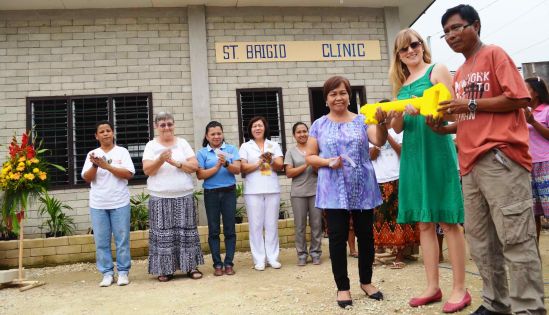|

(Foreground,
right to left) Cebu City Health Officer Dr. Stella Ygonia and
Dianne Duggan of SERVE gives to Tribal Chieftain Felecito Asamsa
the key to the St. Brigid health center, symbol of the Bajau
community's ownership of and responsibility to the new health
center. |
Bajau health center
opens
By
Ramon Aboitiz Foundation Inc.
August 25, 2013
CEBU CITY – The Ramon Aboitiz Foundation Inc. (RAFI), through its Bajau Integrated Area
Development Project (BIAD-P), in coordination with the Presentation
Sisters of the Blessed Virgin Mary (PBVM) and the Nano Nagle School
teachers, turned over a health center to the Bajau community in Sitio
Puntod, Alaska Mambaling, Cebu last Aug. 13.
The community health center
aims to bring together medical practitioners and representatives from
health service provider institutions to undertake collaborative
medical services to improve the health conditions of the Bajau
community.
The construction of the
health center was made possible by PBVM and Misean Cara, one of BIAD-P's
funding donors.
The health center was named
“St. Brigid”, after St. Brigid of Ireland, who was known for miracles
of healing. The construction of the center started last Feb. 1, the
feast day of St. Brigid.
A group of Bajau women,
holding framed pictures of PBVM founder Nano Nagle and Saint Brigid,
blessed the clinic with incense, water, and candle.
Dianne Duggan, one of the
adult leaders of SERVE volunteers, and Dr. Stella Ygonia, Cebu City
Health Officer, turned over the key of the health center to Bajau
Tribal Chieftain Felecito Asamsa and to the cluster leaders.
“Nalipay mi nga adunay
health center dinhi sa among komunidad nga magamit namo kon adunay
medical check-up og trainings bahin sa panglawas (We are glad that we
have a health center where we can hold medical check-ups and trainings
on health and wellness),” Rosalita Jamare, Bajau cluster leader and
health in-charge, said.
The activity was attended by
private and public sector partners, such as the representatives from
the Committee of German Doctors for Developing Countries (German
Doctors), Cebu City Government's City Health Office (CHO), National
Commission of Indigenous People (NCIP), and SERVE volunteers from
Ireland representing Misean Cara.
SERVE volunteers rendered
their service to the Bajau community for almost three weeks from July
13-August 13. They helped in the production of Inter-locking
Compressed Earth Blocks (ICEB), perimeter fence preparation, and
school tutorials with the pre-schoolers, out-of-school youth, and PBVM
student scholars.
The volunteers had the
opportunity to know the Bajau culture through a series of games.
BIAD-P continues to support
the Bajau community through provision of basic social services in
collaboration with various stakeholders. The project is in partnership
with Presentation Sisters of Blessed Virgin Mary, University of San
Carlos-College of Architecture and Fine Arts, and the Cebu City
Government.
The project aims to
effectively transform the Bajau community into a progressive,
self-reliant community by developing their capabilities to live and
work with dignity, to participate in development, and to improve their
lives.
BIAD-P is a project under
the Integrated Development focus area of RAFI, addressing the
foundations needed to develop successful communities. Its other focus
areas include Micro-finance & Entrepreneurship, Culture & Heritage,
Leadership & Citizenship, and Education.